The Democratic Senatorial Campaign Committee (DSCC) is the Democratic Hill committee for the United States Senate. Its purpose is to elect Democrats to the United States Senate. The DSCC's current Chair is Senator Gary Peters of Michigan, who succeeded Nevada's Catherine Cortez Masto after the 2020 Senate elections. DSCC's current executive director is Christie Roberts.

The 1968 United States Senate elections were elections for the United States Senate. Held on November 5, the 34 seats of Class 3 were contested in regular elections. They coincided with the presidential election of the same year. The Republicans picked up five net seats in the Senate. This saw Republicans win a Senate seat in Florida for the first time since Reconstruction.
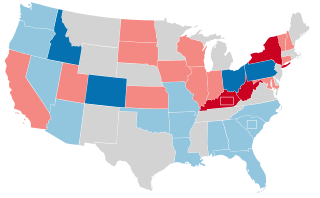
The 1956 United States Senate elections were elections for the United States Senate that coincided with the re-election of President Dwight D. Eisenhower. The 32 seats of Class 3 were contested in regular elections, and three special elections were held to fill vacancies. Although Democrats gained two seats in regular elections, the Republicans gained two seats in special elections, leaving the party balance of the chamber unchanged.

The 1954 United States Senate elections was a midterm election in the first term of Dwight D. Eisenhower's presidency. The 32 Senate seats of Class 2 were contested in regular elections, and six special elections were held to fill vacancies. Eisenhower's Republican party lost a net of two seats to the Democratic opposition. This small change was just enough to give Democrats control of the chamber with the support of an Independent who agreed to caucus with them; he later officially joined the party in April 1955.
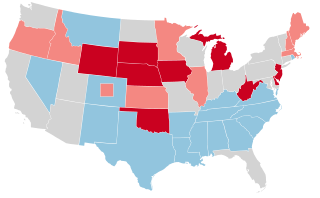
The 1942 United States Senate elections were held November 3, 1942, midway through Franklin D. Roosevelt's third term as president. The 32 seats of Class 2 were contested in regular elections, and two special elections were held to fill vacancies.

The 1912–13 United States Senate elections were held on various dates in various states. They were the last U.S. Senate elections before the ratification of the Seventeenth Amendment in 1913, establishing direct elections for all Senate seats. Senators had been primarily chosen by state legislatures. Senators were elected over a wide range of time throughout 1912 and 1913, and a seat may have been filled months late or remained vacant due to legislative deadlock. Some states elected their senators directly even before passage of Seventeenth Amendment. Oregon pioneered direct election and experimented with different measures over several years until it succeeded in 1907. Soon after, Nebraska followed suit and laid the foundation for other states to adopt measures reflecting the people's will. By 1912, as many as 29 states elected senators either as nominees of their party's primary or in conjunction with a general election.
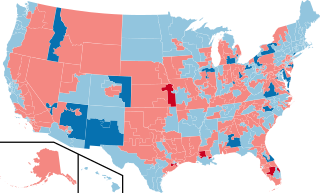
The 2008 United States House of Representatives elections were held on November 4, 2008, to elect members to the United States House of Representatives to serve in the 111th United States Congress from January 3, 2009, until January 3, 2011. It coincided with the election of Barack Obama as president. All 435 voting seats, as well as all 6 non-voting seats, were up for election. The Democratic Party, which won a majority of seats in the 2006 election, expanded its control in 2008.

In the 2006 Georgia elections, Incumbent Governor Sonny Perdue, the first Republican Governor of Georgia since reconstruction, was re-elected over then-Lieutenant Governor Mark Taylor (D).
The politics of Colorado, United States, are that of a blue state. Once considered a swing state that used to be Republican-leaning, Colorado has been trending Democratic since the early part of the 21st century due to the organization of the state Democratic Party, changing demographics, and a rising number of the large unaffiliated bloc of voters leaning Democratic. The growing shift of the state's Republican Party towards social and religious conservatism along with shifting further to the right has also been cited as reasons for the changing voting patterns of Colorado.

The 2002 United States elections were held on November 5, in the middle of Republican President George W. Bush's first term. Republicans won unified control of Congress, picking up seats in both chambers of Congress, making Bush the first President since Franklin D. Roosevelt in 1934 to gain seats in both houses of Congress. In the gubernatorial elections, Democrats won a net gain of one seat. The elections were held just a little under fourteen months after the September 11 attacks. Thus, the elections were heavily overshadowed by the War on Terror.

Virginia's 1999 state elections were held on November 2, 1999. Voters elected all 100 members of the Virginia House of Delegates to two-year terms ending in 2002, and all 40 members of the Virginia Senate to four-year terms ending in 2004. There were also elections for local offices in most counties. The elections resulted in the loss of Democratic control of the House of Delegates for the first time in 116 years, and continued the two-year control of the Senate by Republicans.

The 2018 United States elections were held on Tuesday, November 6, 2018. These midterm elections occurred during Incumbent Republican President Donald Trump's term. Although the Republican Party increased its majority in the Senate, unified Republican control of Congress and the White House was brought to an end when the Democratic Party won control of the House of Representatives in what was widely characterized as a "blue wave" election as Democrats also gained governorships, other statewide offices, and state legislative chambers.

The 2020 United States Senate elections were held on November 3, 2020, with the 33 class 2 seats of the Senate contested in regular elections. Of these, 21 were held by Republicans, and 12 by Democrats. The winners were elected to 6-year terms from January 3, 2021, to January 3, 2027. Two special elections for seats held by Republicans were also held in conjunction with the general elections: one in Arizona, to fill the vacancy created by John McCain's death in 2018; and one in Georgia, following Johnny Isakson's resignation in 2019. These elections ran concurrently with the 2020 United States presidential election in which incumbent president Donald Trump lost to Democratic nominee Joe Biden.
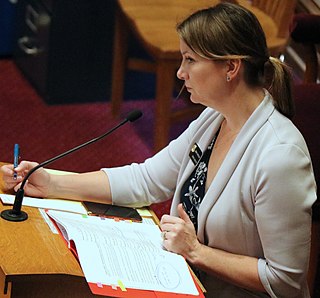
Jessie Danielson is an American politician from the State of Colorado. She is an elected member of the Colorado State Senate representing District 22 after being redistricted from District 20. Previously, she served in the Colorado House of Representatives representing District 24 in Jefferson County. A Democrat, Danielson was first elected in the November 4, 2014 general election.
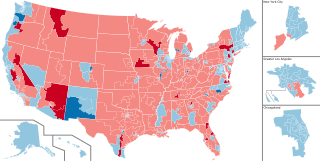
The 2022 United States House of Representatives elections were held on November 8, 2022, as part of the 2022 United States elections during incumbent president Joe Biden's term. Representatives were elected from all 435 U.S. congressional districts across each of the 50 states to serve in the 118th United States Congress, as well as 5 non-voting members of the U.S. House of Representatives from the District of Columbia and four of the five inhabited insular areas. Numerous other federal, state, and local elections, including the 2022 U.S. Senate elections and the 2022 U.S. gubernatorial elections, were also held simultaneously. This was the first election after the 2020 redistricting cycle.

The 2018 Colorado House of Representatives elections took place as part of the biennial United States elections. Colorado voters elected state representatives in all 65 of the state house's districts. State representatives serve two-year terms in the Colorado House of Representatives. The Colorado Reapportionment Commission provides a statewide map of the state House here, and individual district maps are available from the U.S. Census here.

The 2018 Colorado State Senate elections took place as part of the biennial United States elections. Colorado voters elected state senators in 17 of the 35 districts in the state senate. State senators serve four-year terms in the Colorado State Senate. The Colorado Reapportionment Commission provides a statewide map of the state Senate here, and individual district maps are available from the U.S. Census here.

The 2020 Colorado House of Representatives elections took place on November 3, 2020, with the primary elections held on June 30, 2020. Voters in all 65 districts of the state House elected their representative for a two-year term. It coincided with the state Senate elections and the biennial United States elections. The Democratic Party retained control of the House of Representatives. The Democrats gained the 38th District while the Republicans gained the 47th District, resulting in no net seat change.

The 2022 Colorado Senate elections took place on November 8, 2022, along with elections in the State House of Representatives, with the primary elections held on June 28, 2022. Voters in 17 out of the 35 districts of the Colorado Senate elected their representative for a four-year term. It coincided with other Colorado elections of the same year and the biennial United States elections.

The 2014 Colorado Senate elections were held on November 4, 2014 to elect 18 of the 35 members of the Colorado Senate. The election coincided with Colorado House of Representatives elections and other state and federal elections. Primary elections were held on June 24, 2014. Republicans gained control of the chamber for the first time since 2005, gaining one seat.



















